Long-term goals: More resilience, more trust
The central goal of the NIS2 Directive is clear: Europe should become more resistant to cyber attacks. To this end, the Directive focuses on sustainable cyber resilience and aims to establish a security culture that promotes innovation and strengthens trust in digital services. Companies and institutions are required to anchor cybersecurity as an integral part of their strategy.
Future challenges: Always staying up to date
- Technological developments: With new technologies such as IoT, AI and cloud solutions, the attack surfaces are also changing. Security strategies must remain flexible and dynamic to keep pace with the pace of innovation.
- Regulatory harmonization: Uniform standards in all EU member states are the goal — but implementation remains demanding. A common security framework can only be created with clear guidelines and close cooperation.
- Increasing threats: Cyber criminals are becoming more and more professional and using cutting-edge methods. Companies and government agencies must remain alert and continuously invest in their security.
Potential benefits: Innovation and competitive advantage
- Improved security situation: A robust security infrastructure not only protects against attacks, but also increases resilience in the event of a crisis.
- Fostering innovation: The NIS2 Directive creates a framework within which new technologies and solutions in the area of cybersecurity can be developed. Those who invest early can position themselves as pioneers and take advantage of new business opportunities.
- Strengthening trust: Transparent and reliable security measures increase the trust of customers, partners and the public in digital offerings.

.svg)
.png)










